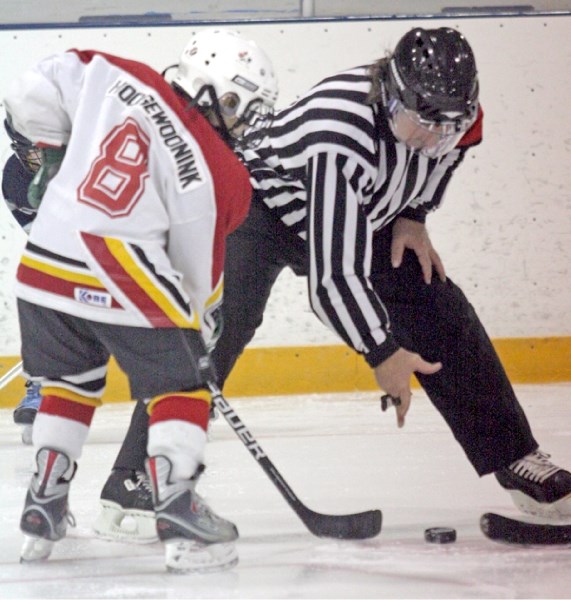Even in a hockey game between the most bitter of rivals, like Edmonton-Calgary or Westlock-Barrhead, chances are the least popular people on the ice are the ones in the striped shirts.
Of course, the irony is that without these brave souls, you couldn’t have a hockey game. Referees are the unsung heroes of nearly any sport — especially since they know their very presence will sometimes make them the target of rude glares, catcalls or worse.
For the Westlock & District Minor Hockey Association, there are only about 15 people who have signed up to officiate games, said Clem Fagnan, the association’s referee in chief. He has experience being on both sides of the whistle, having played for decades and spent about 10 years as a ref.
He is very familiar with how tough it can be to be the one making calls on the ice, and he knows how unpopular refs can be.
“When I started reffing, I actually hated being a ref because I was always so hard on them,” Fagnan said.
People are still hard on them, and that makes it all the more significant when people step forward to fill that role.
“It’s good people are willing to do it,” he said, “but on any given weekend, it’s hard to get people locally.”
Referees can always be called in from surrounding areas if needed, and Fagnan said he got his certification ticket too so he can referee in the case of an emergency.
Generally speaking, though, referees understand what they’re getting into; many of them just do it for a love of the game.
Kelly Baker is one of the minor hockey referees in town, and said that as well as being a bit of extra money in his pocket, refereeing is an opportunity to get back in the game.
“I played hockey for many years. I hurt my back and wasn’t allowed to play hockey anymore. I missed hockey so much and I wanted to be involved,” he said. “I couldn’t play it anymore, but I just wanted to get back on the ice.”
He knows how harsh some coaches and fans can be on referees, but for him it’s just like water off a duck’s back.
“I expect it. I know it’s going to happen and I just block it all out,” he said. “I concentrate on the game and I concentrate on the play. That works well for me.”
That doesn’t mean that the fans and coaches don’t ever get on his case, or that he doesn’t ever have to lay down the law.
“If it gets to the point where they start getting verbally abusive, then I will put a stop to it,” he said. “Other than that, if they’re just doing what they do, yelling and screaming, I just kind of chuckle about it and I just ignore them.”
Another local referee, Karen Brown, said it’s not always as easy for her to ignore the feedback from the bench or the stands. She is the only woman currently refereeing with Westlock Minor Hockey, and despite her 15 years of experience, is still sometimes bothered by what people say.
“I don’t know if I necessarily feel I’m less respected as a woman, but we are different,” she said. “Things that make me mad quick as a ref, a guy just brushes it off. What pushes my buttons on the ice from a coach or a player, might not push my fellow refs’ buttons.”
She tends to just ref the lower levels, and said she thinks it might be different if she was reffing the bantam or midget games.
“Probably the worst thing that’s happened to me is just coaches being really on your case over at the bench. I’ve never had any really bad stuff happen to me,” she said.
A lot of the confusion and frustration, for Brown, comes from the complexity of the rules and the fact that coaches and fans don’t necessarily know as much as they think they do.
“The biggest problem that we as referees feel is an issue is that a lot of parents and coaches don’t know the rules. I can’t tell you how many times I’ve gone into the dressing room with a fellow referee and said, ‘Wow, that guy doesn’t have a clue about the rules,’” she said.
Baker expressed the same concern — the complexity of the rules can make it tough on a referee, and can sometimes lead to the feelings of frustration that get directed towards the refs.
It’s easy for an adult to ignore the jeers and cat-calls, but Baker said he worries about the lesson that is being taught to some of the younger players.
“If the coaches are always yelling and screaming, then that’s what the players are going to learn, and that’s what the players are going to do,” he said. “I see it from atom all the way up to midget.”
Regardless of the reactions they get, though, the local refs seem to all do it out of a genuine love of the game, and the little bit of unpopularity that comes with the job is just part of the package.
Fagnan said that it’s important for the referees to love the game, and said without them, there wouldn’t be hockey.
“To me, it’s a necessary evil. It’s nice that some people are willing to do it, even though they know they’re going to be unpopular.”
For Baker, at least, being unpopular isn’t a concern and he’s just happy to be a part of the game.
“I love being around hockey. I love being around the rink. I love the atmosphere. I love going out there and trying to take control of the game and doing the best to make sure everyone has a fun and safe hockey game,” he said.



